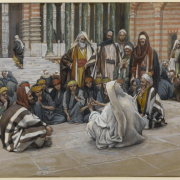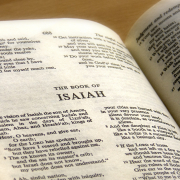What is the Relationship Between Jesus and the Hebrew Scriptures?
Some assume Jesus had very little connection to the Hebrew Scriptures and think he intended to start a new religion. When you read the accounts of Jesus’s life, it becomes plain that nothing could be further from the truth. Jesus’s life was saturated in the Hebrew Scriptures. His entire message was about wholeheartedly following the God of Abraham, Isaac, and Jacob. The Bible that Jesus used for this message was the same as we have today in the Hebrew Scriptures.
Yeshua’s Knowledge of the Scriptures
Yeshua’s lifestyle showed his intimate knowledge of the Scriptures, and he applied them to challenges in his everyday life. In Luke 4, the devil approached Jesus three times and tried to tempt him to sin. Every time, Jesus quoted from the Torah in response to the temptation. For instance, the devil told Jesus that if he worshipped the devil, then all the kingdoms of the world would be given to him. Echoing the message of the Shema, Jesus refused and declared, “It is written, ‘You shall worship the Lord your God, and him only shall you serve’” (Luke 4:8; cf. Deuteronomy 6:13). Every time he was temped in Luke 4, Jesus quoted from Deuteronomy. In fact, Jesus quoted from Deuteronomy more than any other book of the Hebrew Scriptures.1
Another aspect of Jesus’s lifestyle was his celebration of the Jewish holy days as the Scriptures outline. He highly valued Shabbat. He regularly attended synagogue (Luke 4:16) and taught from the Scriptures as any rabbi of his day would have done on Shabbat (Mark 1:21, 6:2; Luke 4:17–21, 31, 6:6, 13:10). Records show that he also celebrated the feasts of Passover (Luke 22), Sukkot (John 7), and Hanukkah (John 10:22–23). There was not an aspect of his life that the Hebrew Scriptures did not affect.
Yeshua’s Teaching and the Scriptures
As with his lifestyle, Jesus’s teaching was also based on the Hebrew Scriptures. Take for instance Jesus’s famous teaching known as the Sermon on the Mount (Matthew 5—7). Here Jesus gave us his position on the Hebrew Scriptures. He taught, “Do not think that I have come to abolish the Law or the Prophets; I have not come to abolish them but to fulfill them” (Matthew 5:17). In this and the following verses, Jesus was saying, “My intent is not to weaken or negate the Law, but by properly interpreting God’s Written Word I aim to establish it, that is, make it even more lasting.”2 In interpreting God’s Word, Jesus quoted from 14 different books of the Hebrew Scriptures in the accounts of his life.3
Jesus went on to strengthen God’s Word in this sermon by expounding upon his audience’s understanding of Scripture as it related to murder, adultery, divorce, lying, retaliation, and love. In speaking of love, Jesus taught, “You have heard that it was said, ‘You shall love your neighbor and hate your enemy.’ But I say to you, love your enemies and pray for those who persecute you” (Matthew 5:43–44). Jesus was commenting on and correcting the people’s understanding of Leviticus 19:18–19, which teaches that we are to love our neighbor. Thus, the first half of their teaching was correct, but the Torah never says to hate your enemy. The heart of the Torah’s teachings is for man to reflect God. This is why Jesus continued by saying, “[love your enemies] so that you may be sons of your Father who is in heaven. For he makes his sun rise on the evil and on the good, and sends rain on the just and on the unjust” (Matthew 5:45). It is man’s nature to hate his enemy, but God shows a common love to all humanity. All of Jesus’ teachings provided correct interpretations of the Hebrew Scriptures.
Yeshua’s Fulfillment of the Scriptures
The most amazing part about Jesus’s connection to the Hebrew Scriptures is that the Scriptures themselves teach about Yeshua before he was born. Yeshua taught his followers that “everything written about me in the Law of Moses and the Prophets and the Psalms must be fulfilled” (Luke 24:44). Every part of the Hebrew Scriptures points to Jesus: the Torah, the Prophets, and the Writings.4 The Torah teaches that the Messiah would be from the line of Judah (Genesis 49:10) and a prophet like Moses (Deuteronomy 18:15–18) just as Jesus was (Matthew 1; Acts 3:22). The Prophets predicted that the Messiah would be born in Bethlehem (Micah 5:2); heal the blind, deaf, and lame (Isaiah 35:5–6); and die for the sins of others (Isaiah 53). Jesus fulfilled these expectations also (Matthew 2:1, 12:22, 15:30; Mark 7:31–35; 2 Corinthians 5:21). The Writings foretold that the Messiah would be crucified (Psalm 22:16) and resurrect from the dead (Psalm 16:10). Again, Jesus fits these descriptions (Matthew 27:32–28:10). Not only was Jesus saturated in the Hebrew Scriptures, but the Hebrew Scriptures are saturated in Jesus. He is all throughout!
Jesus’s relationship with the Hebrew Scriptures is all-encompassing. His entire lifestyle was influenced by God’s Word as he celebrated God’s holy days and used the Scriptures when facing challenges. His teachings were based on the Hebrew Scriptures. Without them, Jesus would not have had much to say. Also, the Hebrew Scriptures prophesied about him. Jesus and the Hebrew Scriptures were so intertwined that it is impossible that Jesus’s intentions were to start a new religion. He is the fulfillment and embodiment of all that the Scriptures teach.
Footnotes
- Gordon J. Wenham, Hearing the Old Testament: Listening for God’s Address, eds. Craig G. Bartholomew and David J. H. Beldman (Grand Rapids, MI: William B. Eerdmans Publishing Company, 2012), 252.
- David Bivin and Roy Blizzard, Understanding the Difficult Words of Jesus (Arcadia, CA: Makor Publishing, 1983), 155.
- Jesus quoted from Genesis, Exodus, Leviticus, Numbers, Deuteronomy, Psalms, Isaiah, Jeremiah, Daniel, Hosea, Jonah, Micah, Zechariah, and Malachi. Steve Moyise, Jesus and Scripture (London, UK: Society for Promoting Christian Knowledge, 2010), 122-3.
- The Hebrew Scriptures are also known as the Tanakh (תָּנָ״ךְ), which is an acronym for the Hebrew words of the three divisions of the Hebrew Scriptures called the Torah (תּוֹרָה), the Prophets (נְבִיאִים), and the Writings (כְּתוּבִים). In Luke 24:44, the book of Psalms was listed as a representative book for the Writings. This is a figure of speech called a synecdoche.




 Public Domain
Public Domain



